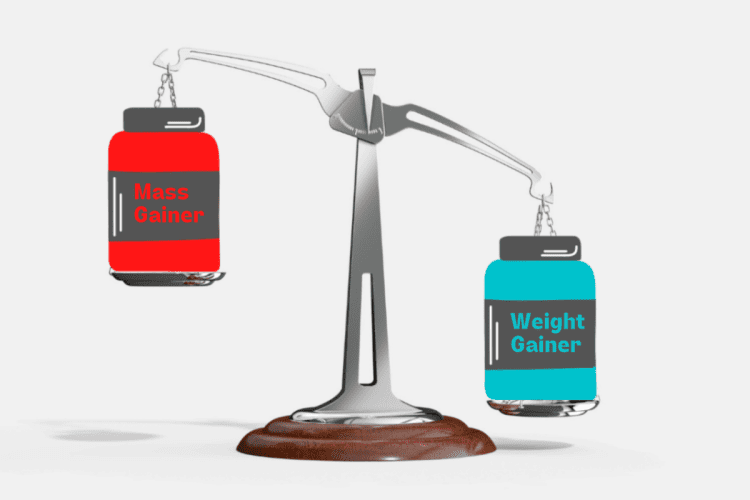Table of Contents
You are reading this because you probably heard from the most jacked dude in your gym that casein is by far the best type of protein out there to gain weight, specifically muscle.
Either that or you have spent hours scouring muscle forums online and have read that a casein supplement may help you gain muscle at a faster rate than other protein supps out there, as well as helping you burn fat.
Here’s the truth: they are all correct [1][2].
But before you leave your house and run to your local supplement store, there is a ton of information that you need to know before buying a tub of casein protein powder.
I have personally switched from brand to brand and consumed pound after pound of protein supplements.
And, even only as an anecdote, I can attest to the effectiveness of casein in helping me gain weight, and eventually building muscle.
Whether they are trying to win a bodybuilding competition or simply want to show off their toned body at the beach, gym-goers usually have the same seemingly impossible goal: to gain muscle weight and burn fat at the same time. This is a very hard-to-reach goal…
Gaining muscle mass means you have to consume more calories than you need; burning fat means you have to consume fewer calories than you need.
The good news is that recent studies [3][4] have shown that you can add slabs and lose flabs at the same time. But, it will obviously take a lot of hard work and consistency.
Casein can help you do both, gaining mass and burn fats at the same time. Keep reading to learn more…
What is Casein?
Casein is one of the two proteins derived from milk. It is more abundant than whey, making up about 80% of milk protein. The other 20% comes from whey.
Whey can be processed into a concentrate, isolate, or hydrolysate.
Casein, on the other hand, can take the form of micellar casein, hydrolysate, and calcium or sodium caseinate.

Micellar casein
Micellar casein is where casein got its fame as the “slow-digesting” protein, making it an awesome pre-bed supplement.
Upon ingestion, it forms a bolus (a small rounded mass) in your stomach that is absorbed slowly by the body, giving you a steady supply of amino acids throughout the day or night.
When you have not eaten for some time like during sleep, your body might normally break down your muscles to feed itself.
A steady stream of amino acids provided by the slow-absorbing micellar casein helps prevent this. So, you can hold on to those gains you worked so hard on.
Casein hydrolysate
Casein hydrolysate is a predigested protein, hence, it is rapidly absorbed by your body. Although heavily processed, this serves to be a good thing.
The processing gives it two and three-peptide amino acids that make sure they are absorbed by the body intact. This gives you a higher net protein balance which is vital for muscle growth.
Calcium caseinate
Calcium caseinate is absorbed quickly like whey. But, their main selling point is the high calcium content it has compared to other protein powders.
One study has shown that a moderately high protein intake along with a high calcium intake increased fecal fat and energy excretion.
In summary,
| Best Pre-Bed or Pre-Fast Protein: | Micellar Casein |
| Best Peri or Intra-Workout Protein: | Casein Hydrolysate |
| Best Fat-Loss Protein: | Calcium Caseinate |
Benefits of Casein Protein
Great for mass building and muscle retention
Casein is more effective in building muscle. It can also provide you a steady stream of much-needed amino acids while on a fast. Not only does it increase protein synthesis, but it also prevents unwanted protein breakdown.
Boosts fat metabolism aka fat loss
Casein in any of its forms has a higher calcium content than whey. And as shown in studies, calcium aids in fat metabolism. Add this to the fact that a slow-digesting protein results in a significantly low insulin response; this signals the body to use fat as an energy source.
Helps increase strength gains from training
In conjunction with resistance training, supplementing with casein helps boost strength gains by up to 20%. One study showed an increase in the muscle size of strength-trained athletes, therefore, adding to their power and the overall poundage they can lift.

Casein Helps You Gain Weight… To An Extent
The main function of any complete protein is to help rebuild most tissues in the body, helping you build muscle more effectively especially at rest.
That building up of muscle tissue will inevitably equal weight gain.
To max out your muscle mass-building and fat loss potential, casein would prove to be the best choice. It has been shown to double the muscle growth and triple the fat loss of the individuals involved in one study.
Even better, casein helps you put on the right “type” of weight. You will be adding functional tissue that not only makes you stronger and faster, more muscle tissue also means you’ll have better resting metabolism aka burning more calories while doing nothing.
If you’re wondering if casein can substitute a mass gainer, then the short answer is no.
Casein supplements are protein supplements, therefore, have minimal carbs and fats.
A standard scoop of casein can contain about 25-30 grams of protein while only having 1-7 grams of carbs or fats.
Mass gainers are in a different supplement category, as they are high-calorie products that can contain up to 250 grams of carbohydrates and the same amount of fats in calories.

Casein Supplements are a (Muscle) Mass Gainer
If you want to take the smart route and gain weight the healthy and correct way, then casein protein will substantially help.
Keep in mind, though, the difference between a casein supp from a mass gainer product: the overall calories one serving of casein delivers from a mass gainer is big, about 500-100 calories in favor of a mass gainer.
Your muscle-to-fat ratio is the best indicator of your overall level of health and fitness, not your body weight.
That being said, it would be best if casein is used in conjunction with a mass gainer. You get the highest quality protein with your much-needed carbs and fats to bump up your calorie intake. This will eventually lead to a significant increase in your overall weight and muscle mass.
FAQs
What are the side effects of casein protein?
There are no side effects to casein, besides the occasional bloat which varies from each individual. The myth that high protein intake has an adverse effect on your kidneys or liver has long been debunked. And, the only times that a high protein diet should be avoided is for people who currently have kidney or liver problems.
What does casein do to your body?
Casein protein has been shown to increase muscle mass better than other proteins. They have also been shown to boost fat metabolism.
Is casein really worth it?
Yes, it is. Although they are pricier than a whey supplement, the benefits they have far outweigh the slight price difference.
Does casein protein keep you full?
Micellar casein, the slow-absorbing type, helps keep you full. This is because it forms into a gel-like substance in your stomach that slows its digestion, therefore, keeping you full.
Is casein a mass gainer?
Casein is not a mass gainer, this is with respect to the high-calorie content of mass gainers. But, casein protein does help you build muscle mass.





